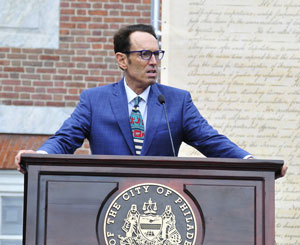Frank Kameny Tribute
National LGBT 50th Anniversary Ceremony
July 4, 2015
 By Malcolm Lazin
By Malcolm Lazin
Chair, National LGBT 50th Anniversary Celebration
There is no one more central to LGBT civil rights than Frank Kameny.
He was our chief strategist and tactician.
He defines the adage that one person can make a difference.
Frank challenged the stereotype that gays were degenerates. He made it his life’s work to prove that gay is good and that we are recognized as first-class American citizens.
The son of Jewish immigrants, Frank served in World War II and was a veteran of the Battle of the Bulge.
He had a 148 IQ. After earning a Harvard Ph.D. in Astronomy, he was employed by the Army Map Service, an early space agency.
When an investigator learned that Frank was gay, he was fired. Even though there had been no workplace misconduct, being fired for being a homosexual was government policy.
While almost all gays would have accepted their fate, for Frank it was the start of a lifelong mission for equality.
Frank filed a lawsuit. The suit became the first LGBT equality brief filed in the United States Supreme Court. In response, the Supreme Court refused to hear his case.
He led a 17-year strategic effort to end federal workplace discrimination. On July 3, 1975, 40 years ago yesterday, the Chairman of the Civil Service Commission notified Frank that the federal government would repeal its ban and would begin hiring gays and lesbians for civilian employment.
Frank counseled gay and lesbian service members facing military discharge including Leonard Matlovich. Frank pioneered for gays and lesbians serving openly in the military.
At a time when pervasive societal homophobia caused many gays to despise themselves, Frank wore a button that defiantly proclaimed “Gay Is Good,” a phrase that he authored and which was inspired by Stokely Carmichael’s “Black Is Beautiful.”
Frank helped found the Mattachine Society of Washington, the capital’s first gay rights organization.
With Barbara Gittings and others, Frank helped organize the Annual Reminders each July 4th, starting in 1965 here at Independence Hall. This was the first time that gay activists from more than one city demonstrated, the first time the demonstration was about equality, the first time that a protest was repeated, and with 40 picketers, the then largest-ever gay rights demonstration in world history.
The Gay Pioneers chose Independence Hall, where the Declaration of Independence and Constitution were signed and where the Liberty Bell— the abolitionists' and suffragettes' freedom symbol—was located. Independence Hall linked gay rights to the Declaration of Independence’s life, liberty and the pursuit of happiness, the Constitution’s promise of equality and the Liberty Bell’s connection with the African-American and women’s civil rights movements.
Frank counseled nonviolence. He was influenced by Gandhi, Bayard Rustin and Dr. Martin Luther King Jr. Over the past 50 years, nonviolence has well served and advanced LGBT equality.
With Barbara Gittings and others, Frank helped organize a 1970 march from Greenwich Village to Central Park to mark the first anniversary of Stonewall. Frank marched carrying the sign “Gay Is Good.” While there had been earlier protests with police in Los Angeles and elsewhere, no one organized a reminder. We remember Stonewall because Frank, Barbara and others organized that June 1970 march, now known as the first New York Pride Parade.
Frank was the first openly gay American to run for Congress.
He helped found organizations that today are known as the National LGBTQ Task Force and the Human Rights Campaign.
He successfully spearheaded a campaign whereby Washington became the nation’s first city to not enforce its sodomy laws.
In one of our nation’s most compelling civil rights stories, Barbara and Frank challenged the American Psychiatric Association’s classification of gay as a mental illness—and won.
Frank Kameny is a towering civil rights leader.
The Library of Congress and Smithsonian have Frank Kameny collections.
His modest D.C. home is on the National Register of Historic Landmarks.
Forty-five years after the July 4th, 1965, Annual Reminder and less than a year before his death, Frank Kameny was invited to stand next to President Obama when the president signed the repeal of Don’t Ask, Don’t Tell, the last vestige of federal workplace discrimination.
Any one of these achievements would have merited the title of a civil rights hero. Collectively, they make Frank Kameny an American civil rights giant and the indisputable father of the LGBT civil rights movement.
Somewhere over the rainbow bluebirds fly; if bluebirds can fly over the rainbow, oh why, oh why can’t I?
Frank gave us hope in a tsunami of homophobia, by his leadership taught us to fly, and by his vision set the flight path for our equality.
If bluebirds can fly over the rainbow, oh why then, oh why can’t I?






